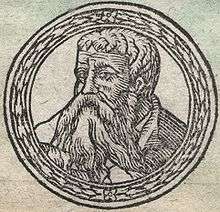List of early Lithuanian dukes
Early dukes of Lithuania (including Samogitia) reigned before Lithuanians were unified by Mindaugas into a state, the Grand Duchy of Lithuania. While the Palemonids legend provides genealogy from the 10th century, only few dukes were mentioned by contemporary historical sources. All of them were mentioned in written sources the 13th century. Data about them is extremely scarce and is usually limited to few brief sentences. The primary sources are the Chronicle of Henry of Livonia and Hypatian Codex.
Rulers recorded in historical sources

- Žvelgaitis (Svelgates) – earliest known duke. In 1205, he attacked Riga and was killed in the battle, led by ruler of Semigallia, Vester.[1]
- Daugirutis (Dangerutis, Dangeruthe) – Livonians imprisoned this Lithuanian duke in 1213, where he killed himself.[2]
- Stekšys (Stakys, Steksė) – another powerful duke, killed in 1214 near Lielvārde.[3]
- Father of Mindaugas – several sources mention that he was a powerful duke, but do not give his name. 16th century genealogies gave him the name of Ryngold or Ringaudas.[4]
- The following Lithuanian dukes signed a peace treaty with the rulers of Galicia–Volhynia in 1219:[5]
- Duke elders
- Živinbudas (presumably the eldest duke)
- Daujotas
- Dausprungas
- Mindaugas (brother of Dausprungas)
- Vilikaila (brother of Daujotas)
- Rulers of Samogitia
- Ruškaičiai family
- Kintibutas
- Vembutas
- Butautas
- Vyžeikis
- Velžys (son of Vyžeikis)
- Kitenis
- Plikienė (wife of Plikys, probably a widow)
- Bulionys family (three brothers, all of them killed by Mindaugas)
- Vismantas (his wife was taken by Mindaugas for himself)
- Gedvilas
- Sprudeikis
- Rulers of the duchy of Deltuva
- Juodikis
- Buteikis
- Bikšys
- Ligeikis
- Duke elders
Of the dukes who signed the peace treaty, only four are mentioned in other written sources: Mindaugas, who went on to become the Grand Duke of Lithuania and was crowned as King of Lithuania in 1253, Vykintas, leader of anti-Mindaugas coalition during the civil war in 1248–1251, Bikšys and Ligeikis, both identified as Mindaugas relatives and nobles, mentioned in a document, dated 1260 and sometimes considered a forgery.[6][7]
See also
- Palemonids – a list of early mythological rulers of Lithuania
- List of Lithuanian rulers
References
- (in Lithuanian) Daugirdaitė-Sruogienė, Vanda (1966). Lietuvos istorija (6th ed.). Chicago, Illinois: TERRA. LCC 67037106.
- Jonynas, Ignas (1937). "Daugirutis". In Vaclovas Biržiška (ed.). Lietuviškoji enciklopedija (in Lithuanian). VI. Kaunas: Spaudos Fondas. p. 108.
- Baranauskas, Tomas. "Brandieji viduramžiai: II dalis (1183-1283 m.)". Chronologija (in Lithuanian). Lietuvos.net. Retrieved 2007-05-30.
- Simas Sužiedėlis, ed. (1970–1978). "Ringaudas". Encyclopedia Lituanica. IV. Boston, Massachusetts: Juozas Kapočius. pp. 500–501. LCC 74-114275.
- Butkevičienė, Birutė; Vytautas Gricius (July 2003). "Mindaugas — Lietuvos karalius". Mokslas ir gyvenimas (in Lithuanian). 7 (547). Archived from the original on 2007-05-23. Retrieved 2007-05-30.
- "Iškilūs žemaičiai ir jų darbai" (in Lithuanian). Regionų kultūrinių iniciatyvų centras. 2006-03-18. Archived from the original on 2007-05-24. Retrieved 2007-05-30.
- Baranauskas, Tomas (2002-12-07). "Kur buvo Lietuvos žemė?". Voruta. 21–23 (519–521). Retrieved 2007-05-30.